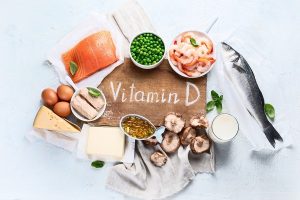The Challenge of Getting Enough Vitamin D While Protecting Your Skin From the Sun

 Vitamin D plays a key role in your overall health. For instance, even if you are getting enough calcium – a vital nutrient that your body needs to build and maintain strong bones – your body can only absorb and use the calcium effectively if you are also getting enough vitamin D. Therefore, in addition to serious health issues such as inflammation, cardiovascular disease, diabetes, and cancer, a vitamin D deficiency can lead to the development of weak bones, fractures, and osteoporosis.
Vitamin D plays a key role in your overall health. For instance, even if you are getting enough calcium – a vital nutrient that your body needs to build and maintain strong bones – your body can only absorb and use the calcium effectively if you are also getting enough vitamin D. Therefore, in addition to serious health issues such as inflammation, cardiovascular disease, diabetes, and cancer, a vitamin D deficiency can lead to the development of weak bones, fractures, and osteoporosis.
Sources of Vitamin D
Very few foods are naturally rich in vitamin D, but it is possible to get it through dietary supplementation or indirectly via sunlight exposure. When the sun’s ultraviolet (UVB) rays reach your skin, your body creates vitamin D precursors, which your kidneys then convert to the active form of vitamin D. After entering your bloodstream, the vitamin D can travel throughout your body to strengthen your bones and facilitate many other vital functions.
While sun exposure can be beneficial in terms of vitamin D production, it can also have harmful consequences, including sunburn, skin damage, and skin cancer. Many sunscreen products are designed to protect your skin by filtering the sun’s UVB rays – the very same UVB rays that help your body produce vitamin D. Because the regular use of sunscreen has been proven to reduce the risk of skin cancer, most experts recommend using it daily – despite its effect on vitamin D production.
How to Safely Boost Your Vitamin D Intake
The best way to know for sure that you are getting enough vitamin D is to have a blood test that measures your vitamin D levels. Then, if necessary, a doctor can recommend safe ways for you to increase your vitamin D intake, such as:
- Eating more foods that are natural sources of vitamin D, such as egg yolks, cheese, salmon, and tuna
- Consuming vitamin D-fortified foods and beverages, such as dairy products, orange juice, and cereal
- Taking nutritional supplements that contain vitamin D
Personalized Nutrition Counseling
Getting an optimal amount of vitamin D from your diet can be tricky, since the levels of absorption, efficiency, and utilization of nutrients can vary significantly from person to person. At Optimum Direct Care, a direct primary care practice located in the Orlando, FL, area, our doctors provide patients with personalized nutrition evaluations and counseling. Our doctors are board-certified family practice physicians.
If you’d like to learn more about our practice, contact us today.
